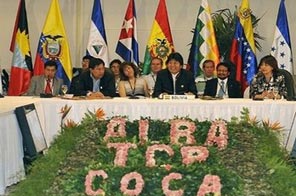LatAm leftists tackle dollar with new currency
COCHABAMBA: Leftist Latin American leaders agreed here on the creation of a regional currency, the Sucre, aimed at scaling back the use of the US dollar.
Nine countries of ALBA, a leftist bloc conceived by Venezuelan President Hugo Chavez, met in Bolivia where they vowed to press ahead with a new currency for intra-regional trade to replace the US dollar.
"The document is approved," said Bolivia's President Evo Morales, who is hosting the summit.
The new currency, dubbed the Sucre, would be rolled out beginning in 2010 in a non-paper form.
That move echoes the European Union's introduction of the euro precursor, the ECU, an account unit designed to tie down stable exchange rates between member states before the national currencies were scraped.
ALBA's member states are Venezuela, Bolivia, Cuba, Ecuador, Nicaragua, Honduras, Dominica, Saint Vincent and Antigua and Barbuda.
The currency, which was backed in April this year, is named after Jose Antonio de Sucre, who fought for independence from Spain alongside Venezuelan hero Simon Bolivar in the early 19th century.
The bloc also called for the replacement of the World Bank's International Centre for Settlement of Investment Disputes, which arbitrates international contract disputes and has probed a slew of disputes involving ALBA members and western energy firms.
Most ALBA members have already withdrawn from the organization, with Ecuador announcing last July that it would pull out of the group.
On Friday Bolivian media reported the country intents to nationalize a electricity distribution firm owned by Spain's Red de Electrica de Espana.
It is just the latest in a series of nationalizations in Venezuela, Ecuador and Bolivia.
In May, Venezuela nationalized 74 energy services firms operating in the oil-rich Maracaibo Lake region.
Bolivia's Evo Morales has indicated that parts for his country's energy and rail sectors will be nationalized.






